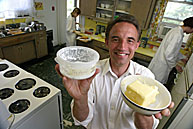Fat-fighting functional oil
A new cooking oil designed by McGill researchers may soon offer relief to calorie counters and cholesterol watchers.
 Hmm, phytosterol -- an active ingredient in a cholesterol-busting designer oil -- or butter? Professor Peter Jones is in the School of Dietetics and Human Nutrition test kitchen.
Hmm, phytosterol -- an active ingredient in a cholesterol-busting designer oil -- or butter? Professor Peter Jones is in the School of Dietetics and Human Nutrition test kitchen.Photo: Owen Egan |
|
Peter Jones, a professor at McGill's School of Dietetics and Human Nutrition, has just completed two promising studies on a new blend of oil that enables people to raise their metabolism, lower their cholesterol and, in some cases, lose weight. Results of the study, completed with a team that included former graduate student Marie-Pierre St. Onge, have been published in four journals: the International Journal of Obesity, the Journal of Nutrition, Obesity Research as well as Metabolism.
"It doesn't take much -- 100 to 200 extra calories per day over a decade -- to make you obese," says Jones.
A simple change in cooking oil may be all it takes for the average North American to maintain a healthy body weight or to lose a few pounds, he says "Controlling obesity is all about engineering a balance between calorie intake and calorie burn."
During two clinical trials, conducted at Macdonald Campus's Mary Emily Clinical Nutrition Research Unit, Jones and his team tested an oil made of medium chain triglycerides (MCT) versus long chain triglycerides (LCT). Trials were conducted over two periods of 27 days on men and women who were about 25 pounds overweight. Both trial periods were separated by washout intervals of four weeks.
The MCT oil that Jones and his team designed for participants -- for now called Functional Oil -- was composed of 65 percent tropical oils, 12 percent olive oil, seven percent canola oil, seven percent flaxseed oil six percent coconut oil and three per cent phytosterols (plant extracts). How the Functional Oil works in fighting fat is simple. "It is directed towards the liver for combustion and burned as energy," says Jones. "The oil is not stored in the body as fat, and heightens the metabolism, which is key in maintaining a healthy body weight. There is also some provoctive data suggesting that oils rich in MCT reduce appetite."
By combusting, rather than absorbing the Functional Oil, male participants lost an average of one pound over a month. "After consuming the Functional Oil over a year, a man could lose one pound per month or 12 pounds per year," says Jones, noting that while female participants experienced heightened metabolic rates, they did not experience any measurable weight reduction.
But a major benefit of the Functional Oil -- for both sexes -- was a significant reduction in cholesterol levels. "The Functional Oil lowered cholesterol levels by over 13 percent," Jones says, compared to olive oil that reduces cholesterol levels by a mere 4.5 percent. "We're pretty impressed, since olive oil was considered the best cholesterol fighter until now."
To those who may be surprised that the McGill team recommends tropical oils, following recent studies that such products may clog arteries, Jones says that "tropical oils are actually fat-busters."
And while past studies on tropical oil MCTs have used animals, the McGill study was the first to test MCTs on humans over a four-week, in-patient and randomized crossover controlled trial. This process allowed McGill researchers to be the first to examine the longer-term effects of consuming MCTs on metabolism.
As for what participants ate during trials, breakfasts could include everything from French toast with maple syrup and yogurt, while dinners could consist of spaghetti with meat sauce, baguette, raw celery with carrots and a date square. "We reproduced a typical North American diet or what could be found in a greasy spoon," explains Jones.
On the first and last day of each trial period participants also underwent magnetic resonance imaging to obtain 40 cross-sectional scans of their bodies. "We basically scanned people's innards to see where their fat was located," he says.
The result? "Participants on a Functional Oil diet decreased their total body volume."
The Functional Oil study, conducted at a cost of $400,000, was funded by Forbes Medi-Tech Inc. and the Dairy Farmers of Canada. Forbes Medi-Tech, which holds the patent to the Functional Oil, is a biopharmaceutical company and is currently conducting more tests on the product before the Functional Oil makes it way to supermarket shelves.

